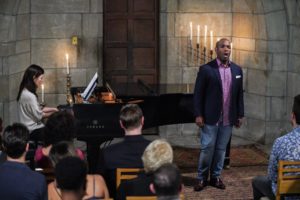
The Crypt Sessions 2018 Review – Lawrence Brownlee
Famed Tenor Wakes the Dead with Classics and Spirituals
By Logan MartellNow in its third season, “The Crypt Sessions,” continues to bring world-class talent to Harlem’s Church of the Intercession for a night of music produced by Unison Media. July 24’s concert saw leading operatic tenor Lawrence Brownlee, joined by pianists Myra Huang and Damien Sneed, letting loose with a variety of songs from Classical, Jazz, Gospel, and more.
Brownlee began with “Una furtiva lagrima,” from Donizetti’s “L’Elisir D’Amore,” making for a highly touching opening. This soon unfolded into Brownlee filling the crypt with his firm but gentle resonance, particularly on the line “Ah, cielo! Si puo! Si puo morir!.” After this, Brownlee gave few brief words on his love for songs that employ a wide variety of vocal colors, ones that allow him through his interpretation to perform a sort of “text painting.”
Next on the program was excerpt from Schumann’ “Dichterliebe.” Pianist Myra Huang opened with ponderous larghetto chords, which often shifted to an almost frantic allegro and back again after a tapering silence. From his recent song cycle “Cycles of My Being,” which conveys the perspective of life as an African-American man, was the first movement, titled “Inhale, exhale.” The perfect quality of the chords suggested an idealism that soon found itself beset by a tumultuous melody. The charged high C Brownlee delivers on the word “Hysteria!” filled the crypt and lent its anguish to his imagery of “blackjacks and nightmares.”
After this, Brownlee performed a number of jazz standards after acknowledging their influence on him as an artist, mentioning figures such as Sting, Steely Dan, Nat King Cole, Sammy Davis Jr., and Duke Ellington. He began this section with Hoagy Carmichael’s “The Nearness of You;” the sweetly-simple lyrics, “When you are near… Oh my… Oh no…” shone through the tones of Brownlee’s delivery, still retaining a more operatic loft from his previous numbers. Myra Huang’s rapturous runs took to starry heights, building towards the end of the second chorus, which Brownlee tenderly concludes with his phrasing of “and to feel in the night, the nearness of you.”
The remaining songs were played with Gospel great Damien Sneed on piano, their first number of the night being Gershwin’s “Love is Here to Stay.” With its rather grand lyrics, Brownlee’s delivery of the opening verse and chorus at first favored the soaring heights, rather than the human, romantic aspect; this aspect became the focus in the second half, Brownlee using the contrast between them to paint a complete picture, capping off the closing phrase after a soulful glissando by Sneed. After this, Brownlee spoke of his prior experiences which shaped his musical direction, saying: “I used to direct a gospel choir, I used to play the bass guitar in a rock group, I used to sing in a boy band, I used to work as a singer/dancer at an amusement park, I almost had a call to go on a national tour of “Grease” when I was 22; so again, my musical education and background is varied… Singing in the church: my father was a choir director, my mother was a soloist; I was one of six kids so we all sang. I actually hated to sing as a kid, I didn’t want to; my mom said there was a time when I sang “Go Tell it on the Mountain” in my sleep, so music is in me, but it all started with Gospel.”
The next number “Amazing Grace,” was one of the evening’s highlights, as Brownlee’s reverential tones soared away with Sneed’s extended piano runs, including a series of inversions to accompany the lines “I once was lost…” Brownlee and Sneed ended this number in a powerful unison.
Bringing the evening to a close was a trio of songs Brownlee referred to as “Spiritual Sketches,” for their Gospel roots and unpolished power. First was “Every Time I feel the Spirit,” which had a highly driving dissonance lent beauty by Brownlee’s rejoicing. The next song “All Day, All Night,” Brownlee dedicated to his son Caleb, his love made apparent by the phrasing of lines such as “angels watching over me,” and his usage of charged coloratura. All this culminated with the final song “Come By Here,” where Brownlee’s resonant voice sounded likely to bring down the crypt in an explosive finale.


